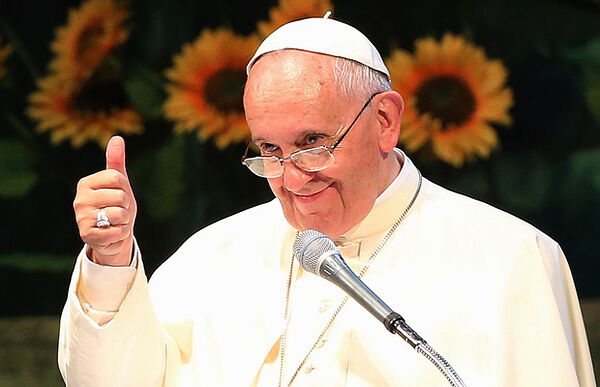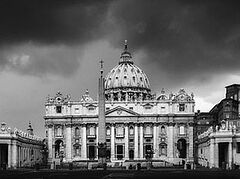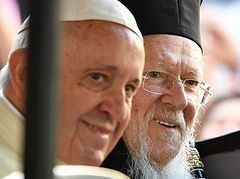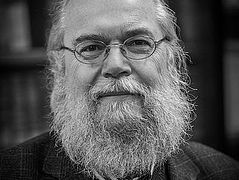One sometimes hears of Orthodox Christians converting to Roman Catholicism. In my experience, they usually do not leave Orthodoxy for Roman Catholicism because of their delight in the Novus Ordo post-Vatican II Mass, nor out of infatuation with the current Pope Francis, who has proved such a problem for RC traditionalists that they seem to employ an army of spin doctors to photoshop his comments, such as those about homosexuality when he said, “Who am I to judge?” Rather, their conversion is often rooted in their acceptance of what they call “the papal claims”.
Over two millenia there have, of course, been many papal claims, many of which Orthodoxy has always accepted. The claim to be the Patriarch of the West has proved unobjectionable to the East. The claim to be the primate of the Church is also unobjectionable, though this one requires some historical context (see below). It is the claims explicated in detail at the First Vatican Council of 1870 that have proved the sticking point. But let us proceed slowly and carefully.
The early Church has known a number of different primacies. To understand this, we need to leave the present and visit the past where each bishop was the sovereign pastor of all the congregations of the city in which he lived, including the surrounding countryside. Each bishop was sovereign and independent to a degree we can scarcely imagine today. Briefly put, if his people stood behind him, there was no ecclesiastical mechanism which could dislodge him, whether he fell into heresy or not. This would change beginning with Constantine, but in those early days each bishop of a city/ diocese was effectively sovereign and independent.
e was also connected to other bishops because it was understood that the episcopate was one and commonly shared, and that each bishop was the local manifestation of a larger whole. That was why that when a bishop died and a successor was needed all the local bishops in the area would come together to consecrate his successor. A minimum of three was required, but the participation of every bishop in surrounding area was the expected norm. A bishop was sovereign within his diocese, but was not isolated.
As a part of this system it was also required that each bishop coordinate with the senior bishop in the area—the protos—the one who would serve as coordinator and focal point of unity for them all. This was the foundation of the system of Metropolitans in the Church, wherein the bishops did not remain in splendid isolation from one another, but met together and tried to work in unity. This is the primatial principle in the Church—the notion that each bishop must look for coordination, help, and guidance from his brother bishops, including especially their senior bishop, the Metropolitan. In the early days, this seniority seems to have been determined by age alone; later was determined by the importance of the see. It was all quite natural and inevitable: young inexperienced people naturally look to their seniors for guidance and defer to them.
Thus a number of primacies naturally developed in the Church. Larger sees with many people, much influence, a lot of money, and a lot of martyrs, inevitably came to dominate smaller sees who looked to them for guidance. The big see of Alexandria came to dominate the smaller villages of Egypt. Antioch (the third biggest city in the empire) came to influence the lesser sees in Syria. And Rome—big, rich in money, charitable works, martyrs, and the capital of the empire—came to have a corresponding influence.
This influence was varied and multi-faceted. Those churches nearest Rome in central and southern Italy were happy to receive its direct guidance, much as the Egyptian towns looked to Alexandria for guidance. More distant churches, such as those in North Africa, were more independent and less happy with what they sometimes considered illegitimate meddling. But Rome had a wide influence, not least because it had a wonderful reputation for orthodoxy and doctrinal reliability. That is why St. Ignatius could refer to the city as “presiding in love” (Epistle to the Romans, 1.1) and why St. Irenaeus, looking for sure anchors of doctrine in his battle against the Gnostics, could suggest that every church should “agree” (Latin convenire) with her doctrine “because in her the apostolic tradition has always been safeguarded by those who are everywhere” (Against Heresies, 3.3.2). We note that there is here no word about papal authority; it is the doctrine of the city and its track record that is the source of its influence, not the notion that its bishop possessed any special hotline to God via St. Peter.
After the Reformation and Counter-reformation with its mudwrestling over the Pope’s authority, we can sometimes forget that (as St. Cyprian taught) the episcopate was one, and in the early Church what was of supreme authority was the truth itself. This being so, every bishop had the obligation by virtue of his office to correct neighbouring wayward bishops. Canons would be eventually formulated to prevent a free-for-all, but the notion of mutual episcopal responsibility never entirely died out. The letter of brotherly rebuke from St. Clement of Rome to the neighbouring Corinthians was one early example of this. St. John Chrysostom’s much later intervention among Asian bishops was another. This latter involved John’s action (the Asians said “his meddling”) beyond strictly-defined canonical boundaries, and from a strictly canonical point of view, John was a bit out of line. But if all bishops had some kind of responsibility for their brothers, his actions become more comprehensible.
The primacy of the bishop of Rome was universally acknowledged to be on this kind. As the elder brother among the bishops and as bishop of a city with a stellar track record, Rome was always listened to respectfully. If churches were intent on building a consensus, Rome’s vote was almost essential. And when one found oneself with a grievance, Rome was one of the cities to which appeal was always made. (Milan was another, as was Aquileia. Chrysostom appealed to all three when he was in trouble).
But this primacy did not mean that Rome’s views and judgments were always obeyed. St. Cyprian famously quarrelled with Stephen of Rome, and Africa in general was suspicious of such appeals over the sea to Rome. Respect did not always translate into obedience, largely because no one really believed that Rome had the authority to command such obedience.
The patristic legacy, though providing a wealth of misleading proof-texts when yanked out of context, is complicated. Men could appeal to Rome and speak of her in glowingly submissive terms when they wanted her help, and also reject her authority quite brusquely when they disagreed with her. But whatever such proof-texts might say, the real indicator of what the ancient Church thought was how it behaved.
That is, the wider Church never behaved in such a way as to give the impression that Rome had supreme authority to teach and govern. When theological or disciplinary matters arose, they did not simply appeal to Rome and then murmur “Roma locuta; causa finita”. They called ecumenical councils, and then had to await to see whether the results of the council would be generally accepted. When Rome famously did not want another council held to condemn Dioscurus, but instead wanted the matter reserved to itself, the Church held a council anyway at Chalcedon. No one thought the Pope was competent to overturn a previous council or decide such matters. Only another council could do that.
This then is the papal primacy of the early church that Orthodoxy still accepts: Rome as the first among equals, with a limited canonical authority, the elder brother whose voice is important and essential to consensus. Later, of course, another view of papal primacy developed in the West.
As the West drifted from the East and had to live its life far removed from the authority, help, and armies of Byzantium, it had to make its own way, and Rome had to find its own political protectors. It did so, and the Holy Roman Empire was born (which was famously described as “not holy, not Roman, and not an empire”). In that world, the Pope quickly became embroiled in a wrestling match with secular rulers, and needed all the canonical help he could get to survive and to retain his independence—even to the point of using forged material (the so-called “False Decretals” outlining the foundation of papal power). In this world, the assertion of papal supremacy was considered necessary for the Pope’s integrity and independence. In the East, the patriarchs were part of a family. In the West, the Pope was more or less on this own. And when you’re on your own, you do what you have to on order to survive.
The decree of Vatican I represents the culmination of this long and gradual western development. It reads in part, “We teach and declare that, according to the gospel evidence, a primacy of jurisdiction over the whole Church of God was immediately and directly promised to the blessed apostle Peter and conferred on him by Christ the Lord…The jurisdictional power of the Roman Pontiff is both episcopal and immediate…We teach and define as a divinely revealed dogma that when the Roman Pontiff speaks ex cathedra, that is, when, in the exercise of his office as shepherd and teacher of all Christians, in virtue of his supreme apostolic authority, he defines a doctrine concerning faith or morals to be held by the whole Church, he possesses, by the divine assistance promised to him in blessed Peter, that infallibility which the divine Redeemer willed His Church to enjoy in defining doctrine concerning faith or morals. Therefore, such definitions of the Roman Pontiff are of themselves, and not by the consent of the Church, irreformable.”
It is this claim which the Orthodox Church rejects. This papal encyclical (called “Pastor Aeternus”) declares that “the jurisdictional power of the Roman Pontiff is both episcopal and immediate”—that is, that the Pope has the authority to teach and govern any bishopric in the world, even over the protest of the incumbent bishop. It also asserts that when speaking ex cathedra—i.e. from his teaching chair, intending to pronounce upon faith and morals—his teaching will be infallibly true and not subject to revision by one, even apart from the consent of the Church. His teaching in such circumstances derives its authority not because he reflects the consensus of the Church throughout the centuries, but solely because God supernaturally helps him. The encyclical further declares that this has always been “the perpetual practice of the Church” and the declarations of the Ecumenical Councils.
A look at the long and complicated history of the papacy reveals that this view of the papacy was never the “perpetual practice of the Church” nor was it contained in the declarations of the Ecumenical Councils. In this the author of the encyclical was either badly misinformed or lying—neither of which alternatives promote confidence in the reliability of papal encyclicals generally or of papal infallibility. Spin doctors suggesting that the encyclical was produced as a response to outside political pressure and because the Pope needed to shore up his authority are of little use. Contextualization will only take you so far. As an assertion of the Church’s “perpetual practice” the document is simply and spectacularly wrong.
Pastor Aeternus is a part of the papal claims. After 1870 viewing papal authority in terms of universal influence based on track record (the patristic view) was no longer on the table of options for Roman Catholics. Those accepting papal claims must sign on to the reliability of Pastor Aeternus. This the Orthodox Church will never do. The claims of Pastor Aeternus are demonstrably false.





